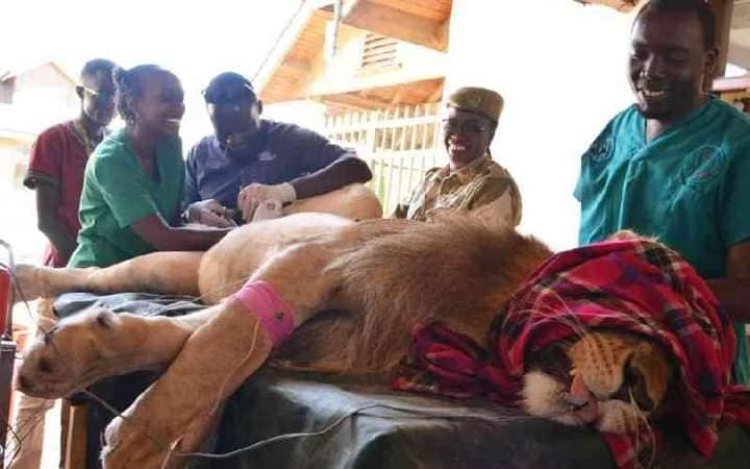Kakamega Man Exposes How Wife Became Pregnant Despite Vasectomy
On July 12, 2022, he underwent the procedure at a hospital in Navakholo, an exercise carried out by local doctors with the funding of a non-governmental organization.

A middle-aged man in Kakamega County on Thursday, May 18 left his family from Shikoti village in Kakamega County stunned after his wife managed to conceive despite him undergoing a vasectomy.
The man had expressed his disappointment over what he alleged was a botched medical procedure which came after the couple had three children.
On July 12, 2022, he underwent the procedure at a hospital in Navakholo, an exercise carried out by local doctors with the funding of a non-governmental organization.
"Immediately after getting three kids, my wife and I agreed to take up a family planning method that best suited us. I saw it wise that I take up the responsibility as a man and engage doctors who would advise on the best option.

An ambulance rushing a patient to a hospital. /DAILY NATION
"Doctors operated on me and did a vasectomy, a permanent and irreversible process. The vasectomy was done on July 12, 2022, and the doctors told me that I would be safe after 20 conjugal exercises or three months," he recounted.
His wife however expressed scepticism over the decision in fear that the procedure would affect their sexual life, only to realise that it got even better.
12 months later, the couple is expecting their fourth child in June 2023 not knowing what took place in the exercise they believed would help plan their family, especially during the tough economic times. They had three children in quick succession between 2020 and 2022 when the pandemic constrained employees to work from home.
The man was informed that the couple would be safe, 20 ejaculations after the procedure, which was three months or thereabouts, thus they knew that until October, they would be safe.
"After five months, we got shocked when my wife missed her menstrual period. At the time, we did not think of pregnancy as a possibility.
"In December 2022, we decided to visit doctors for a pregnancy test, and our fears were confirmed that she was indeed pregnant with another child," he continued.
He further recalled having to go through stressful periods as a couple since his wife came from two caesarean sections before his procedure.
“We were informed that this happens when there are some sperms left in the ducts or just a failure of the whole procedure,” the man, who is a health practitioner himself, revealed.
On her part, the wife expressed confidence that her family will get through the uncertainty even after the birth of their fourth child.
“We trust each other and we are believers so there have never had issues of fearing the other party might be up to something bad,” she noted.
Can A Woman Get Pregnant After Vasectomy?
Dora Amakobe, a doctor who has conducted successful male sterilization procedures, revealed that there was a possibility that the method would fail if the patient does not follow the full instructions of the doctor, including not having unprotected sex for more than three months.
“Due to the length of the vas deferens, you could cut a part of it but semen has lined up to the urethra, so if you engage in sex almost immediately after the procedure, there is a likelihood of causing a pregnancy so we advise our clients to use protection for about 21 ejaculations,” Amakobe told Citizen Digital.
After abstinence, vasectomies are considered the most effective method of birth control due to their long-term success rate of over 99 per cent. In fact, only 1-2 women out of every 1,000 end up pregnant within a year of their partner receiving a vasectomy.
US-based doctor, Puneet Masson, MD, Director of the Male Fertility Program at Penn Medicine, had revealed in 2019 that “Theoretically, you could get your partner pregnant right after a vasectomy if there is still sperm upstream of where the vasectomy was,” even though one's sperm count will decrease gradually after a vasectomy.
“You should have your urologist test a sample of your semen after approximately eight weeks or 20 ejaculations following the vasectomy to make sure it’s free of sperm,” Dr Masson was quoted by Penn Medicine's blog post.
Vasectomy Process
There are two types of vasectomy, which is usually a 30-minute process: a conventional vasectomy using a scalpel (surgical knife) and a no-scalpel vasectomy; a doctor doing your vasectomy will discuss which option is best for you.
In conventional, the doctor first numbs your scrotum with a local anaesthetic. They then make 2 small cuts in the skin on each side of your scrotum to reach the tubes that carry sperm out of your testicles (vas deferens).
Each tube is cut and a small section is removed. The ends of the tubes are then closed, either by tying them or sealing them using heat.
The cuts are stitched, usually using dissolvable stitches that go away on their own within about a week.
For non-scalpel, the doctor first numbs your scrotum with a local anaesthetic. They then make a tiny puncture hole in the skin of your scrotum to reach the tubes, meaning they don't need to cut the skin with a scalpel.
The tubes are then closed in the same way as a conventional vasectomy, either by being tied or sealed. There's little bleeding and no stitches with this procedure, which is thought to be less painful and less likely to cause complications than a conventional vasectomy.







